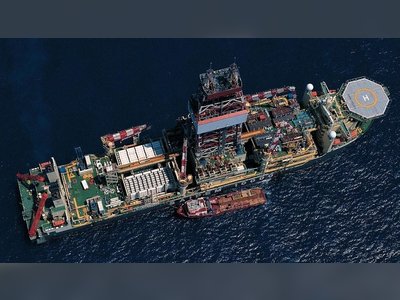
US Confiscates Iran Oil Cargo On Tanker Amid Tensions: Report
As oil markets remain jittery, the cargo seizure is the latest escalation between Washington and Tehran after years of sanctions pressure by the U.S. over Iran's nuclear program.
The U.S. confiscated Iranian oil on a tanker at sea in recent days in a sanctions enforcement operation, three sources said, and days later Iran seized another oil-laden tanker in retaliation, according to a maritime security firm.
As oil markets remain jittery, the cargo seizure is the latest escalation between Washington and Tehran after years of sanctions pressure by the U.S. over Iran's nuclear program. Iran does not recognise the sanctions, and its oil exports have been rising.
Tehran says its nuclear program is for civilian purposes while Washington suspects Iran wants to develop a nuclear bomb.
Maritime security company Ambrey said the U.S. confiscation took place at least five days before Iran's action on Thursday. "Ambrey has assessed the seizure by the Iranian Navy to be in response to the U.S. action," it said in an advisory to clients.
"Both tankers were Suezmax-sized. Iran has previously responded tit-for-tat following seizures of Iranian oil cargo."
The sources familiar with the matter, who declined to be identified due to the sensitivity of the issue, said Washington took control of the oil cargo aboard the Marshall Islands tanker Suez Rajan after securing an earlier court order. The tanker's last reported position was near southern Africa on April 22, ship tracking data showed.
The vessel's Greece-based manager, Empire Navigation, and the U.S. Department of Justice did not immediately respond to requests for comment.
The U.S. Navy said Iran seized a Marshall Islands-flagged tanker in the Gulf of Oman on Thursday, the latest seizure or attack by Tehran on commercial vessels in sensitive Gulf waters.
Iranian state TV said on Friday the tanker ignored radio calls for eight hours following a collision with an Iranian boat, which left several crewmen injured and three missing. "Before using force, we tried to call the vessel ...to stop but they did not cooperate," Iranian deputy navy commander Rear Admiral Mostafa Tajodini told the broadcaster.
U.N. Secretary-General Antonio Guterres was aware of the Gulf of Oman seizure and reaffirmed support for international maritime law, a U.N. spokesperson said on Friday.
Last year the U.S. tried to confiscate a cargo of Iranian oil near Greece, which prompted Tehran to seize two Greek tankers in the Gulf. Greece's supreme court ordered the cargo returned to Iran. The two Greek tankers were later released.
In a step likely to exacerbate tensions, 12 U.S. senatorson Thursday urged President Joe Biden to remove Treasury Department policy hurdles that have prevented the Department of Homeland Security from seizing Iranian oil shipments for more than a year.
In 2020, Washington confiscated four cargoes of Iranian fuel aboard foreign ships that were bound for Venezuela and transferred them with the help of undisclosed foreign partners onto two other ships which then sailed to the U.S.
As oil markets remain jittery, the cargo seizure is the latest escalation between Washington and Tehran after years of sanctions pressure by the U.S. over Iran's nuclear program. Iran does not recognise the sanctions, and its oil exports have been rising.
Tehran says its nuclear program is for civilian purposes while Washington suspects Iran wants to develop a nuclear bomb.
Maritime security company Ambrey said the U.S. confiscation took place at least five days before Iran's action on Thursday. "Ambrey has assessed the seizure by the Iranian Navy to be in response to the U.S. action," it said in an advisory to clients.
"Both tankers were Suezmax-sized. Iran has previously responded tit-for-tat following seizures of Iranian oil cargo."
The sources familiar with the matter, who declined to be identified due to the sensitivity of the issue, said Washington took control of the oil cargo aboard the Marshall Islands tanker Suez Rajan after securing an earlier court order. The tanker's last reported position was near southern Africa on April 22, ship tracking data showed.
The vessel's Greece-based manager, Empire Navigation, and the U.S. Department of Justice did not immediately respond to requests for comment.
The U.S. Navy said Iran seized a Marshall Islands-flagged tanker in the Gulf of Oman on Thursday, the latest seizure or attack by Tehran on commercial vessels in sensitive Gulf waters.
Iranian state TV said on Friday the tanker ignored radio calls for eight hours following a collision with an Iranian boat, which left several crewmen injured and three missing. "Before using force, we tried to call the vessel ...to stop but they did not cooperate," Iranian deputy navy commander Rear Admiral Mostafa Tajodini told the broadcaster.
U.N. Secretary-General Antonio Guterres was aware of the Gulf of Oman seizure and reaffirmed support for international maritime law, a U.N. spokesperson said on Friday.
Last year the U.S. tried to confiscate a cargo of Iranian oil near Greece, which prompted Tehran to seize two Greek tankers in the Gulf. Greece's supreme court ordered the cargo returned to Iran. The two Greek tankers were later released.
In a step likely to exacerbate tensions, 12 U.S. senatorson Thursday urged President Joe Biden to remove Treasury Department policy hurdles that have prevented the Department of Homeland Security from seizing Iranian oil shipments for more than a year.
In 2020, Washington confiscated four cargoes of Iranian fuel aboard foreign ships that were bound for Venezuela and transferred them with the help of undisclosed foreign partners onto two other ships which then sailed to the U.S.











